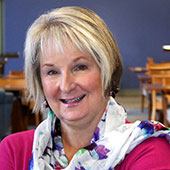
I use this same column header every fall. It’s not for lack of creativity. It just captures the way I feel at the start of the academic year. It’s exciting to see new faculty, staff, and students. It is equally exciting to see old friends. This year is especially meaningful because we haven’t seen each other in such a long time.
Even though the building was closed from March until September 2020, when we reopened with limited hours and services, the HSHSL hummed along. The HSHSL is much greater than its building. We quickly moved to online services, remote learning, distance consultations, and we continued to build our infrastructure, growing the UMB Digital Archive and the UMB Data Catalog. We introduced new services, such as contactless pickup, a website refresh, and a building headcount system. We applied for and were awarded Region 1 of the Network of the National Library of Medicine, and also the Network Web Services Office. The regional office is a distinction we have held for over 35 years. (See the Regional Medical Library article below for more information.) Our Historical Collections were used by researchers far and wide … digitally. We launched our Center for Data and Bioinformation Services (CDABS) – a hub for data and bioinformation learning, services, resources, and communication. In April, we launched Citizen Science: Gearing Up for Discovery, a MOOC aimed at building a citizen science community. And who can forget our outstanding April Fool’s edition of Connective Issues?
And now we are getting ready to develop our strategic plan for 2021-2026. We will be working with library staff, library users, our constituents, and many others to construct a plan that aligns with UMB Themes to promote the success of our communities. Stay tuned for announcements of a series of town halls for faculty, staff, and students.
An incredible year is behind us, and a busy one ahead! We look forward to engaging with everyone, wherever we find you – onsite, online, in the classroom or the lab … wherever. We want to be where you are. Welcome and welcome back!








